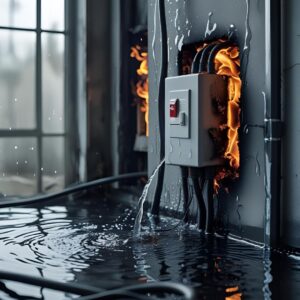Water damage is the worst fear of every homeowner—but were you aware it can result in something even more hazardous? A rarely acknowledged but serious threat is the danger of electrical fires resulting from water leaks. Can water leak cause electrical fire? Absolutely, turning a small plumbing issue into a disastrous safety concern for your household.
This blog will assist you in grasping the link between water leaks and electrical fires, as well as practical advice to protect your house. By the conclusion, you’ll not only understand how a water leak can cause electrical fire but also how to identify leaks promptly, avoid dangers, and safeguard your property from possible catastrophe.

How a Water Leak Can Cause an Electrical Fire
You may be thinking, can a leak from water lead to an electrical fire? The response is affirmative. Water and electricity form a deadly pair, and in certain situations, even a minor leak can develop into a fire caused by electricity.
When water interacts with electrical wires or devices, it can lead to short circuits and overheating. Electrical arcs produced during short circuits can ignite fires, particularly if combustible materials are present.
Common scenarios include:
- Leaks in the roof above electrical wiring or circuit panels. As time passes, water dripping from ceilings can soak electrical fixtures.
- Burst pipes near appliances. Dishwashers, washing machines, and kitchen outlets are high-risk zones.
- Leaks behind walls. Hidden plumbing issues can saturate wiring behind drywall, creating unseen dangers.
- Flooded basements. Rising water levels can submerge outlets, fuse boxes, or extension cords.
Understanding these risks is the first step toward preventing disasters.
Steps to Prevent Water Leaks and Electrical Hazards
Preventing issues is preferable to resolving them, particularly in safeguarding your home against dangers such as water leaks and electrical fires. Adhere to these practical suggestions to lower your risk:
- Check Your Home’s Plumbing Regularly
- Examine pipes, taps, and water heaters for leaks or evidence of corrosion. Even minor leaks can result in major issues eventually.
- Seal Roofs and Windows
- Keep out rainwater by sealing cracks in your roof, windows, and doors. Address minor damages before they turn into expensive repairs.
- Install GFCI Outlets
- GFCI outlets are engineered to shut off electricity upon sensing moisture or an unusual electrical current. It is essential to install these in kitchens, bathrooms, and outdoor spaces.
- Keep Water and Wiring Separate
- Make sure that electrical outlets, wiring, and appliances are set up away from water sources like sinks, bathtubs, or dishwashing areas.
- Upgrade to Modern Wiring
- If you reside in an older residence with old wiring, think about a modernization. Updated insulation and contemporary designs can lower the chances of leaks.
- Invest in Leak Detectors
- Intelligent leak sensors can notify you of an issue before it escalates. Numerous devices of this kind also have shut-off valves to avert flooding.
These proactive measures can go a long way toward avoiding water and electrical mishaps.
Detecting Water Leaks Early
Not every leak shows up as puddles on the ground. Numerous leaks are concealed behind walls, beneath sinks, or in basements, making detection more challenging. Nevertheless, identifying them early can avert significant harm.
Look out for these warning signs:
- Discolored walls or ceilings. Yellow stains or bubbling paint may indicate a hidden leak soaking your drywall.
- Unforeseen increase in water charges. A rapid rise could indicate a leak in your plumbing system.
- Mold and mildew. Wet conditions promote mold development, which can produce stale smells.
- Dripping sounds. If you hear water dripping but don’t see it, investigate further.
- Reduced water pressure. This often occurs when water is escaping from somewhere else along the pipe system.
- Warm or damp spots on flooring. This can indicate a leaky pipe within your floors.
Consistently observing these warning signs can aid in detecting leaks more promptly.
What to Do If You Suspect a Leak
If you suspect water has come into contact with your home’s electrical system, quick action can minimize damage. Here’s what you should do immediately:
- Turn Off Electricity
- Go to your home’s circuit breaker and shut off electricity to the affected zones. This reduces the risk of short circuits and fires.
- Turn Off the Water Supply
- Locate your home’s main water valve and turn it off to prevent further leakage.
- Call the Experts
- Reach out to a certified plumber to fix the water leak and an electrician to evaluate your electrical system for any harm. Refrain from trying any home repairs unless you are completely qualified.
- Don’t Use Wet Appliances
- If water has reached your outlets or appliances, don’t attempt to use them. They could deliver a fatal electric shock or cause sparks.
- Dry the Area
- After the experts assess the damage, begin drying the area with towels, fans, or dehumidifiers.
Your safety is the highest priority. Address a water-related electrical issue without delay.
Protect Your Home With Regular Maintenance
Ensuring a secure residence involves implementing preventive actions. Consistent maintenance of your plumbing and electrical systems can stop leaks from turning into dangerous threats.
Hire professionals for annual inspections of your roof, pipes, and electrical systems. Supplement these with smart tools like water sensors and GFCI outlets. A little maintenance today can save you from major expenses, risks, and the challenges of selling a fire-damaged house down the line.
Previous